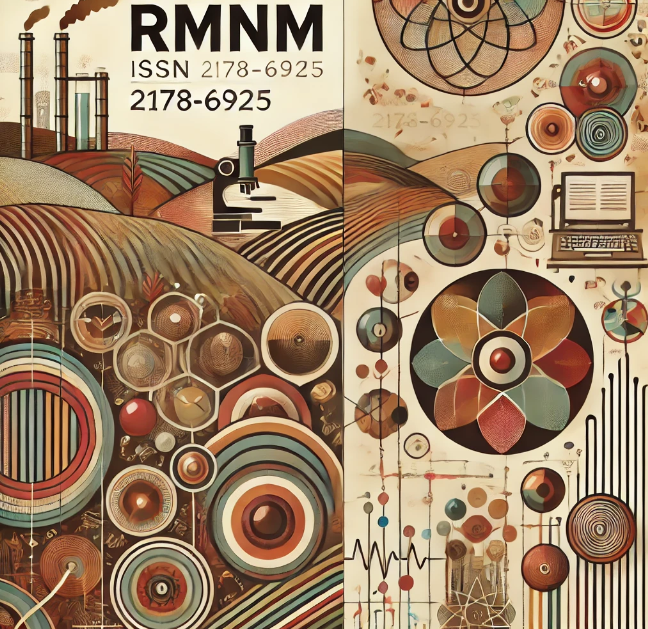HUMANIDADE E TECNOLOGIA:
IMPLICAÇÕES ÉTICAS E FILOSÓFICAS
DOI:
https://doi.org/10.61164/rmnm.v12i1.3062Palavras-chave:
Humanidade, tecnologia, antropoceno, futurologiaResumo
Este artigo explora as complexas questões éticas e filosóficas que surgem com o desenvolvimento de novas tecnologias, abordando seus potenciais benefícios, como o aumento da produtividade, a melhoria de serviços e a resolução de problemas globais enquanto alerta sobre os seus riscos, como a discriminação algorítmica, a perda de controle humano sobre os sistemas eletrônicos, as mudanças climáticas e o Antropoceno. O estudo ainda examina os diferentes princípios éticos que podem ser usados para orientar o desenvolvimento e o uso da inteligência artificial, como o princípio da beneficência, o princípio da não maleficência, o princípio da justiça e o princípio da autonomia, além de estabelecer conexões entre os avanços tecnológicos e áreas da filosofia, tais como o Transumanismo e a Futurologia no desenvolvimento de um marco ético sólido a fim de garantir que ela seja usada de forma responsável e benéfica para a humanidade.
Referências
ASIMOV, Isaac. I, Robot. 1. ed. Gnome Press, 1950.
BODDINGTON, Paula. Towards a Code of Ethics for Artificial Intelligence. 1. ed. Springer, 2017.
BOSTROM, Nick. Human Enhancement. 1. ed. Oxford University Press, 2009.
BOSTROM, Nick. Superintelligence: Paths, Dangers, Strategies. 1. ed. Oxford University Press, 2016.
BOYD, Danah; CRAWFORD, Kate. 2012. Critical Questions for Big Data. Information, Communication & Society, 15, 2012. p. 662–679.
COECKELBERGH, Mark. AI Ethics. 1. ed. The MIT Press, 2020.
COECKELBERGH, Mark. New Romantic Cyborgs. 1. ed. MIT Press, 2017.
CONCEIÇÃO, Gislaine Cristina da. Big Data e Dados Pessoais: Questões Legais Emergentes na Perspectiva da Ciência da Informação. Dissertação (Mestrado em Ciência da Computação) – Universidade Federal de São Carlos. São Carlos, 2023.
DONAHUE, Wesley. Professional Ethics: A Competency-Based Approach to Understanding and Applying Professional Ethics. 1. ed. Independente, 2021.
DRUGA, Stefania; WILLIAMS, Randi. 2017. Kids, AI Devices, and Intelligent Toys. MIT Media Lab. 6 de jun. de 2017. Disponível em: <https://www.media.mit.edu/posts/kids-ai-devices/> Acesso em: 05 de abr. de 2024.
FUCHS, Christian. Digital Labour and Karl Marx. 1. ed. Nova York. Routledge, 2014.
FULLER, Steve. Humanity 2.0: What It Means to Be Human Past, Present and Future. 1. ed. Palgrave MacMillan, 2011.
HAKKEN, David. Computing And Social Change: New Technology and Workplace Transformation, 1993. Department of Sociology and Anthropology & Technology Policy Center, SUNY Institute of Technology, Utica, Nova York, 1993.
JACOBS, Kerrin Artemis. Digital loneliness—changes of social recognition through AI companions. Frontiers. 2024. Disponível em: <https://www.frontiersin.org/journals/digital-health/articles/10.3389/fdgth.2024.1281037/full>. Acesso em: 05 de mai. de 2024.
KHARPAL, Arjun. Stephen Hawking Says A.I. Could Be ‘Worst Event in the History of Our Civilization’. CNBC. 6 de nov. de 2017. Disponível em: <https://www.cnbc.com/2017/11/06/stephen-hawking-ai-could-be-worst-event-in-civilization.html>. Acesso em: 01 de mai. de 2024.
KURZWEIL, Raymond. The Singularity Is Near. 1. ed. Viking Penguin, 2005.
LEAVER, Tama; WILLSON, Michele; BALNAVES, Mark. Transparency and the Ubiquity of Information Filtration?. 2012. Disponível em: <https://www.ctrl-z.net.au/articles/issue-2/leaver-willson-balnaves-transparency-and-the-ubiquity-of-information-filtration/>. Acesso em: 30 de mar. de 2024.
LEM, Stanisław. Summa Technologiae. 1. ed. Wydawnictwo Literackie, 1964.
LEWIS, Simon L.; MASLIN, Mark A. Defining the Anthropocene. Science, 519, 2015.
MARCUSE, Herbert. One-Dimensional Man. 1. ed. Boston. Beacon Press, 1991.
MASINI, Eleonora; SAMSET, Knut. Recommendations of the WFSF General Assembly. WFSF Newsletter. jun. 1975. p. 15.
MCLUHAN, Marshall. Laws of Media: The New Science. 1. ed. Toronto University Press, 1988.
MIN, Alfonso. Artificial Intelligence And Bias: Challenges, Implications, and Remedies. 2023. Disponível em: <https://www.researchgate.net/publication/374232878>. Acesso em: 19 de mar. 2024.
PITEIRA, Martinha; APARICIO, Manuela; COSTA, Carlos J. A Ética na Inteligência Artificial: Desafios. Instituto Universitário de Lisboa. Lisboa, 2022.
SCHMIDT, Douglas. Google Data Collecting, 2018. Institute for Software-Integrated Systems, Vanderbilt University, Nashville, Tennessee, 2018.
SEN, Jaydip. Security and Privacy: Issues in Cloud Computing. 2015. Disponível em: https://www.researchgate.net/publication/345128332. Acesso em: 20 abr. 2024.
SHANAHAN, Murray. The Technological Singularity. 1. ed. The MIT Press, 2015.
TAUBE, Mortimer. Computers and Common Sense: The Myth of Thinking Machines. 1. ed. Geminis, 1961.
TAVANI, T. Herman. Ethics and Technology. 4. ed. Wiley, 2013.
TURKLE, Sherry. Alone Together: Why We Expect More from Technology and Less from Each Other. 1. ed. Nova York. Basic Books, 2011.
Downloads
Publicado
Como Citar
Edição
Seção
Licença
Copyright (c) 2024 Revista Multidisciplinar do Nordeste Mineiro

Este trabalho está licenciado sob uma licença Creative Commons Attribution-NonCommercial-ShareAlike 4.0 International License.







